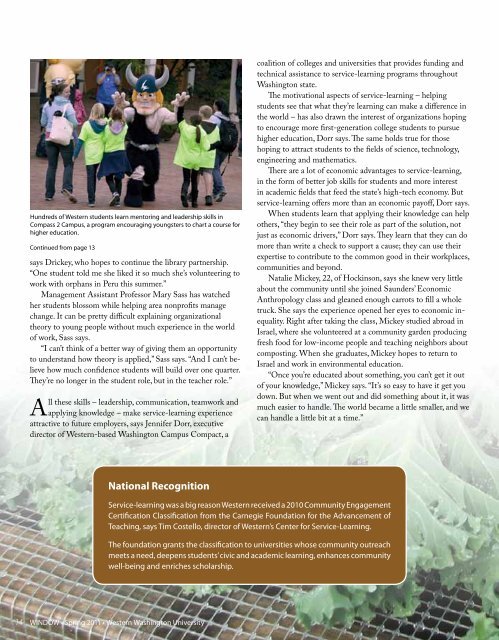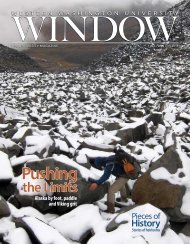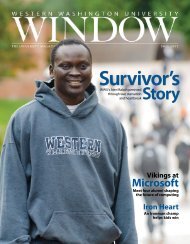BEFORE THEY’RE GONE
BEFORE THEY'RE GONE - WINDOW - The magazine for WWU
BEFORE THEY'RE GONE - WINDOW - The magazine for WWU
You also want an ePaper? Increase the reach of your titles
YUMPU automatically turns print PDFs into web optimized ePapers that Google loves.
Hundreds of Western students learn mentoring and leadership skills in<br />
Compass 2 Campus, a program encouraging youngsters to chart a course for<br />
higher education.<br />
Continued from page 13<br />
says Drickey, who hopes to continue the library partnership.<br />
“One student told me she liked it so much she’s volunteering to<br />
work with orphans in Peru this summer.”<br />
Management Assistant Professor Mary Sass has watched<br />
her students blossom while helping area nonprofits manage<br />
change. It can be pretty difficult explaining organizational<br />
theory to young people without much experience in the world<br />
of work, Sass says.<br />
“I can’t think of a better way of giving them an opportunity<br />
to understand how theory is applied,” Sass says. “And I can’t believe<br />
how much confidence students will build over one quarter.<br />
They’re no longer in the student role, but in the teacher role.”<br />
All these skills – leadership, communication, teamwork and<br />
applying knowledge – make service-learning experience<br />
attractive to future employers, says Jennifer Dorr, executive<br />
director of Western-based Washington Campus Compact, a<br />
coalition of colleges and universities that provides funding and<br />
technical assistance to service-learning programs throughout<br />
Washington state.<br />
The motivational aspects of service-learning – helping<br />
students see that what they’re learning can make a difference in<br />
the world – has also drawn the interest of organizations hoping<br />
to encourage more first-generation college students to pursue<br />
higher education, Dorr says. The same holds true for those<br />
hoping to attract students to the fields of science, technology,<br />
engineering and mathematics.<br />
There are a lot of economic advantages to service-learning,<br />
in the form of better job skills for students and more interest<br />
in academic fields that feed the state’s high-tech economy. But<br />
service-learning offers more than an economic payoff, Dorr says.<br />
When students learn that applying their knowledge can help<br />
others, “they begin to see their role as part of the solution, not<br />
just as economic drivers,” Dorr says. They learn that they can do<br />
more than write a check to support a cause; they can use their<br />
expertise to contribute to the common good in their workplaces,<br />
communities and beyond.<br />
Natalie Mickey, 22, of Hockinson, says she knew very little<br />
about the community until she joined Saunders’ Economic<br />
Anthropology class and gleaned enough carrots to fill a whole<br />
truck. She says the experience opened her eyes to economic inequality.<br />
Right after taking the class, Mickey studied abroad in<br />
Israel, where she volunteered at a community garden producing<br />
fresh food for low-income people and teaching neighbors about<br />
composting. When she graduates, Mickey hopes to return to<br />
Israel and work in environmental education.<br />
“Once you’re educated about something, you can’t get it out<br />
of your knowledge,” Mickey says. “It’s so easy to have it get you<br />
down. But when we went out and did something about it, it was<br />
much easier to handle. The world became a little smaller, and we<br />
can handle a little bit at a time.”<br />
National Recognition<br />
Service-learning was a big reason Western received a 2010 Community Engagement<br />
Certification Classification from the Carnegie Foundation for the Advancement of<br />
Teaching, says Tim Costello, director of Western’s Center for Service-Learning.<br />
The foundation grants the classification to universities whose community outreach<br />
meets a need, deepens students’ civic and academic learning, enhances community<br />
well-being and enriches scholarship.<br />
14 WINDOW • Spring 2011 • Western Washington University








